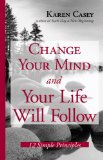 Change Your Mind and Your Life Will Follow
Change Your Mind and Your Life Will Follow
12 Simple Principles
by Karen Casey
Conari Press, 2005. 149 pages.
Starred Review
Sonderbooks Stand-out 2010: #2 Other Nonfiction
This is a simple book about living a more peaceful and loving life. I found the thoughts presented to be profound, as you can tell by the twenty-two times I chose selections from this book for Sonderquotes.
The 12 simple principles make up the first twelve chapters, with a summary chapter at the end. Here are the principles as they are listed in the chapter titles:
1. Tend your own garden.
2. Stop focusing on problems so their solutions can emerge.
3. Let go of outcomes.
4. Change your mind.
5. Choose to act rather than react.
6. Give up your judgments.
7. Remember that you are not in control.
8. Discover your own lessons.
9. Do no harm.
10. Quiet your mind.
11. Every encounter is a holy encounter — respond accordingly.
12. There are two voices in your mind — one is always wrong.
I told you they were simple! You’ve probably heard most of these ideas before, but she helps you see how you can actually do these things, and convinces you how much it will help.
Here’s a passage I enjoyed from “Tend Your Own Garden”:
“Let’s celebrate the fact that we are in charge of no one but ourselves. It relieves us of a heavy burden, and a thankless job, one that never blesses us. Taking control of every thought we have and every action we take, and being willing to relinquish the past while savoring the present, will assuredly keep us as busy as we need to be. Doing these things, and only these things is why we are here. It’s only when we live our own lives and manage our own affairs, freeing others to do the same, that we will find the peace we seek and so deserve.”
She gives similar advice in the chapter “Choose to Act Rather Than React”:
“Minding other people’s business simply isn’t the work we are here to do, regardless of how seductive the idea may be. We each must make our own journey, and even when it appears that someone we love is making a poor decision about an important matter, unless we are asked for advice, it’s not our place to offer it. Besides, minding your own business will keep you as busy as you would ever need to be.”
In the chapter “Give Up Your Judgments,” she says:
“When I embrace the practice of unconditional love — seldom an easy exercise, I might add — I am able to see how similar I am to those around me, and my habit of judgment lessens. Please note the word ‘habit.’ Judgment does become a habit, and so can unconditional love, though it is more difficult to perfect. A tool that has worked for me (when I remember to use it) is to express a statement of unconditional love out loud every time a judgmental thought crosses my mind. Try it next time you find yourself gripped by judgment. As soon as you catch it, state your unconditional love. It works.”
Another theme of focusing on yourself, not others comes in “Remember That You Are Not In Control”:
“What we discover when we give up trying to control everybody and everything is that we suddenly have the time and opportunity to learn and change and grow within ourselves, so that we can progress to the next level of spiritual awareness that awaits us.
“A surprise benefit, too, is that by letting go, moving on, and living our own lives peacefully and with intention, we often inspire others to change in the very ways we want them to change. Ironic, isn’t it?”
From “Every Encounter Is a Holy Encounter,” we find this wise advice:
“We can never know who we really are unless we have others to interact with. Perhaps most difficult to understand, in all this, is that the people with whom we have the most difficult relationships are the ones from whom we learn the most. It is in these more fraught interactions that our minds are healed the most.
“That’s why it’s so important to choose to be grateful for every relationship. We simply cannot know what God has intended for each of them to mean in our lives. We can only be sure that they are present to help us heal.”
In the final chapter, she gives us encouragement to go out there and begin:
“How we acquire better lives is not very mysterious. It comes back to making better choices, beginning with the most important choice of all: Whom will we listen to, the aggressive boss ego or the quiet, wise voice that’s always there to guide us to a higher place? You don’t have to make huge changes all at once. I wouldn’t even suggest trying. Just commit, one day at a time, to changing your mind, and you will begin to experience that peaceful life you deserve. The power of one mind changing cannot be overstated. Are you willing to be an example?”
Buy from Amazon.com
Find this review on Sonderbooks at: www.sonderbooks.com/Nonfiction/change_your_mind.html
Disclosure: I am an Amazon Affiliate, and will earn a small percentage if you order a book on Amazon after clicking through from my site.
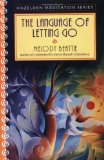
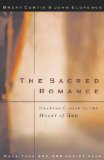

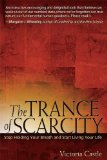
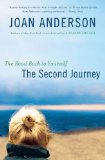

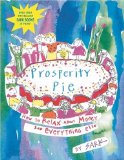 Prosperity Pie
Prosperity Pie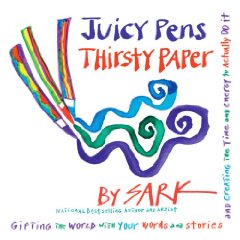 Juicy Pens, Thirsty Paper
Juicy Pens, Thirsty Paper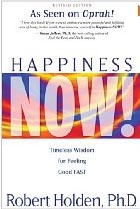 Happiness Now!
Happiness Now!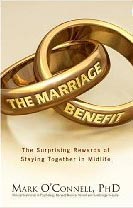 The Marriage Benefit
The Marriage Benefit